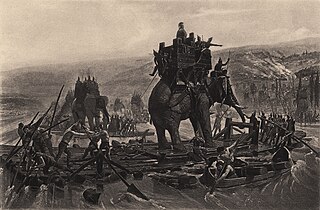
The 3rd century BC started the first day of 300 BC and ended the last day of 201 BC. It is considered part of the Classical Era, epoch, or historical period.
During the 290s BC, Hellenistic civilization begins its emergence throughout the successor states of the former Argead Macedonian Empire of Alexander the Great, resulting in the diffusion of Greek culture throughout the Levant and advances in science, mathematics, philosophy, etc. Meanwhile, the Roman Republic is embroiled in war against the Samnites, the Mauryan Empire continues to thrive in Ancient India, and the Kingdom of Qin in Ancient China, the one which in the future will conquer its adversaries and unite China, begins to emerge as a significant power during the Warring States period.
This article concerns the period 289 BC – 280 BC.
This article concerns the period 279 BC – 270 BC.
This article concerns the period 269 BC – 260 BC.
Year 276 BC was a year of the pre-Julian Roman calendar. At the time it was known as the Year of the Consulship of Gurges and Clepsina. The denomination 276 BC for this year has been used since the early medieval period, when the Anno Domini calendar era became the prevalent method in Europe for naming years.
Year 275 BC was a year of the pre-Julian Roman calendar. At the time it was known as the Year of the Consulship of Dentatus and Caudinus. The denomination 275 BC for this year has been used since the early medieval period, when the Anno Domini calendar era became the prevalent method in Europe for naming years.
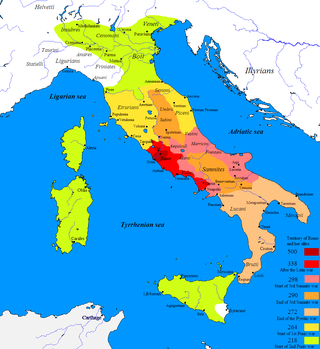
Year 272 BC was a year of the pre-Julian Roman calendar. At the time it was known as the Year of the Consulship of Cursor and Maximus. The denomination 272 BC for this year has been used since the early medieval period, when the Anno Domini calendar era became the prevalent method in Europe for naming years.
Year 280 BC was a year of the pre-Julian Roman calendar. At the time it was known as the Year of the Consulship of Laevinus and Coruncanius. The denomination 280 BC for this year has been used since the early medieval period, when the Anno Domini calendar era became the prevalent method in Europe for naming years.
Year 297 BC was a year of the pre-Julian Roman calendar. At the time it was known as the Year of the Consulship of Rullianus and Mus. The denomination 297 BC for this year has been used since the early medieval period, when the Anno Domini calendar era became the prevalent method in Europe for naming years.
Year 295 BC was a year of the pre-Julian Roman calendar. It was known in the Roman Republic as the Year of the Consulship of Rullianus and Mus. The denomination 295 BC for this year has been used since the early medieval period, when the Anno Domini calendar era became the prevalent method in Europe for naming years.
Year 281 BC was a year of the pre-Julian Roman calendar. At the time it was known as the Year of the Consulship of Barbula and Philippus. The denomination 281 BC for this year has been used since the early medieval period, when the Anno Domini calendar era became the prevalent method in Europe for naming years.
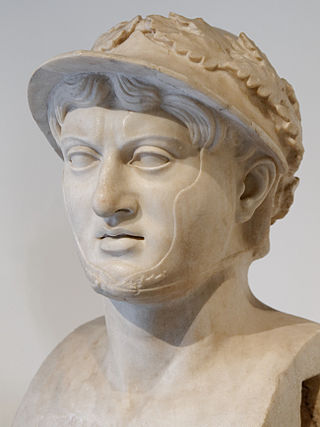
Pyrrhus was a Greek king and statesman of the Hellenistic period. He was king of the Molossians, of the royal Aeacid house, and later he became king of Epirus. He was one of the strongest opponents of early Rome, and had been regarded as one of the greatest generals of antiquity. Several of his victorious battles caused him unacceptably heavy losses, from which the term "Pyrrhic victory" was coined.
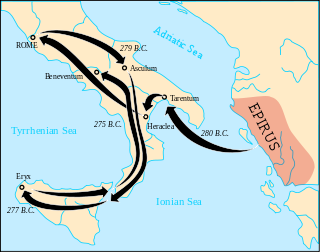
The Battle of Heraclea took place in 280 BC between the Romans under the command of consul Publius Valerius Laevinus, and the combined forces of Greeks from Epirus, Tarentum, Thurii, Metapontum, and Heraclea under the command of Pyrrhus, king of Epirus. Although the battle was a victory for the Greeks and their casualties were lower than the Romans, they had lost many veteran soldiers that would be hard to replace on foreign soil.

The Battle of Asculum took place near Asculum in 279 BC between the Roman Republic under the command of the consuls Publius Decius Mus and Publius Sulpicius Saverrio, and the forces of King Pyrrhus of Epirus. The battle took place during the Pyrrhic War, after the Battle of Heraclea of 280 BC, which was the first battle of the war. There exist accounts of this battle by three ancient historians: Dionysius of Halicarnassus, Plutarch, and Cassius Dio. Asculum was in Lucanian territory, in southern Italy. The Battle of Asculum was the original “Pyrrhic victory”.

The Pyrrhic War was largely fought between the Roman Republic and Pyrrhus, the king of Epirus, who had been asked by the people of the Greek city of Tarentum in southern Italy to help them in their war against the Romans.
The treaties between Rome and Carthage are the four treaties between the two states that were signed between 509 BC and 279 BC. The treaties influenced the course of history in the Mediterranean and are important for understanding the relationship between the two most important cities of the region during that era. They reveal changes in how Rome perceived itself and how Carthage perceived Rome, and the differences between the perception of the cities and their actual characteristics.
Brennus was one of the Gaulish leaders of the army of the Gallic invasion of the Balkans. While invading the Greek mainland he managed to momentarily reach as far south as Delphi in an attempt to loot the rich treasury of the sanctuary of Apollo. His army suffered a devastating defeat at Delphi; he was heavily injured during the battle and committed suicide there. His militarily inexperienced army was forced to a continuous retreat by the tactical attacks of the Greek city-states and was cut down to a remaining band that fled from Greece.
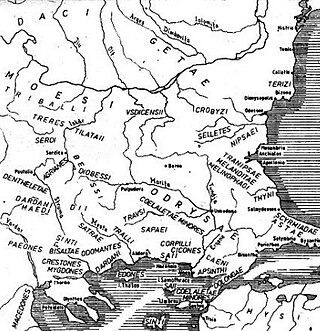
The Battle of Thermopylae was fought in 279 BC between invading Gallic armies and a combined army of Greek Aetolians, Boeotians, Athenians, and Phocians at Thermopylae. The Gauls under Brennus were victorious, and advanced further into the Greek peninsula where they attempted to sack Delphi but were completely defeated.
Bolgios was a Gaulish leader during the Gallic invasion of the Balkans who led an invasion of Macedon and Illyria in 279 BC, killing the Macedonian king Ptolemy Keraunos.





